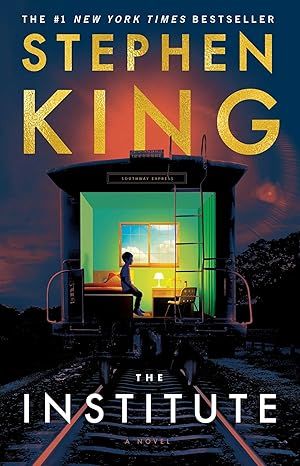The Institute: A NovelAudiobook
4.6
-
59,683 ratings
From #1 New York Times bestselling author Stephen King, the most riveting and unforgettable story of kids confronting evil since It. “This is King at his best” (The St. Louis Post-Dispatch).
In the middle of the night, in a house on a quiet street in suburban Minneapolis, intruders silently murder Luke Ellis’s parents and load him into a black SUV. The operation takes less than two minutes. Luke will wake up at The Institute, in a room that looks just like his own, except there’s no window. And outside his door are other doors, behind which are other kids with special talents—telekinesis and telepathy—who got to this place the same way Luke did: Kalisha, Nick, George, Iris, and ten-year-old Avery Dixon. They are all in Front Half. Others, Luke learns, graduated to Back Half, “like the roach motel,” Kalisha says. “You check in, but you don’t check out.”
In this most sinister of institutions, the director, Mrs. Sigsby, and her staff are ruthlessly dedicated to extracting from these children the force of their extranormal gifts. There are no scruples here. If you go along, you get tokens for the vending machines. If you don’t, punishment is brutal. As each new victim disappears to Back Half, Luke becomes more and more desperate to get out and get help. But no one has ever escaped from the Institute.
As psychically terrifying as Firestarter, and with the spectacular kid power of It, The Institute “is another winner: creepy and touching and horrifyingly believable, all at once” (The Boston Globe).
Kindle
$9.99
Available instantly
Audiobook
$0.00
with membership trial
Hardcover
$15.97
Paperback
$12.43
Ships from
Amazon.com
Payment
Secure transaction
ISBN-10
1982110589
ISBN-13
978-1982110581
Print length
576 pages
Language
English
Publisher
Scribner
Publication date
August 31, 2020
Dimensions
5.31 x 1.4 x 8.25 inches
Item weight
15.2 ounces
Popular Highlights in this book
It was so simple, but it was a revelation: what you did for yourself was what gave you the power.
Highlighted by 1,943 Kindle readers
Trump and his cronies took it all back. They understand culture no more than a donkey understands algebra.
Highlighted by 1,004 Kindle readers
And so he set out for DuPray. Great events turn on small hinges.
Highlighted by 323 Kindle readers
Product details
ASIN :
B07N943MFX
File size :
4910 KB
Text-to-speech :
Enabled
Screen reader :
Supported
Enhanced typesetting :
Enabled
X-Ray :
Enabled
Word wise :
Enabled
Editorial reviews
“A big shank of a book that reminded me instantly of many of the reasons I loved (love?) [King]. His characters are the kind of people who hear the trains in the night. The music is always good. He swings low to the ground. He gets closer to the realities and attitudes of working-class life in America than any living writer I can think of.” —Dwight Garner, The New York Times
"Throughout his long career, King has been committed to the bedrock notion that stories matter, that they help us understand both ourselves and the world we inhabit. The Institute, filled as it is with anger, sorrow, empathy and, yes, hope, reiterates that commitment with undiminished power. It is a first-rate entertainment that has something important to say. We all need to listen.” —William Sheehan, The Washington Post
“As consummately honed and enthralling as the very best of [King’s] work...How do you maintain your dignity and humanity in an environment designed to strip you of both? That theme, such an urgent one in literature from the 20th century onward, falls well within King’s usual purview...Of all the cosmic menaces that King’s heroes have battled, [the] slow creep into inhumanity may be the most terrifying yet, because it is all too real.” —Laura Miller, The New York Times Book Review
“The Institute is another winner: creepy and touching and horrifyingly believable, all at once.” —The Boston Globe
“This is King at his best.” —The St. Louis Post-Dispatch
“Gripping… This is a thriller — and a good one, at that. There’s little in the way of King’s usual emphasis on the occult beyond the topic of psychic powers, which, according to surveys, as many as 40% of Americans believe are real. But there’s no shortage of monsters, that’s for sure. They just come in the coldblooded, end-justifies-the-means, laws-don’t-apply-to-us human variety. We have no trouble believing that those types of people are real. And they are plenty scary.” —The Minneapolis Star Tribune
“Fans will draw parallels between Luke’s tight band of friends and the kids at the center of It, in which the Losers Club faces off against a murderous clown, but this is an entirely original story that can only come from the mind of a master teller like King.” —The Florida Times Union
“King wows with the most gut-wrenching tale of kids triumphing over evil since It….Tapping into the minds of the young characters, King creates a sense of menace and intimacy that will have readers spellbound…Not a word is wasted in this meticulously crafted novel, which once again proves why King is the king of horror.” —Publishers Weekly, STARRED review
"You don’t need to be a horror fan to read The Institute — or to have The Institute take over your life, since this is generally what happens with King’s novels...His storytelling transcends genre." —Marion Winnick, Newsday
“Shocking suspense and hallmark thrills…The Institute offers a thrilling reading experience and rousing tribute to the resilience of children and the unending fight against evil.” —G. Robert Frazier, BookPage
Read more
Sample
1. The Night Knocker
Half an hour after Tim Jamieson’s Delta flight was scheduled to leave Tampa for the bright lights and tall buildings of New York, it was still parked at the gate. When a Delta agent and a blond woman with a security badge hanging around her neck entered the cabin, there were unhappy, premonitory murmurings from the packed residents of economy class.
“May I have your attention, please!” the Delta guy called.
“How long’s the delay gonna be?” someone asked. “Don’t sugarcoat it.”
“The delay should be short, and the captain wants to assure you all that your flight will arrive approximately on time. We have a federal officer who needs to board, however, so we’ll need someone to give up his or her seat.”
A collective groan went up, and Tim saw several people unlimber their cell phones in case of trouble. There had been trouble in these situations before.
“Delta Air Lines is authorized to offer a free ticket to New York on the next outbound flight, which will be tomorrow morning at 6:45 AM—”
Another groan went up. Someone said, “Just shoot me.”
The functionary continued, undeterred. “You’ll be given a hotel voucher for tonight, plus four hundred dollars. It’s a good deal, folks. Who wants it?”
He had no takers. The security blond said nothing, only surveyed the crowded economy-class cabin with all-seeing but somehow lifeless eyes.
“Eight hundred,” the Delta guy said. “Plus the hotel voucher and the complimentary ticket.”
“Guy sounds like a quiz show host,” grunted a man in the row ahead of Tim’s.
There were still no takers.
“Fourteen hundred?”
And still none. Tim found this interesting but not entirely surprising. It wasn’t just because a six forty-five flight meant getting up before God, either. Most of his fellow economy-class passengers were family groups headed home after visiting various Florida attractions, couples sporting beachy-keen sunburns, and beefy, red-faced, pissed-off-looking guys who probably had business in the Big Apple worth considerably more than fourteen hundred bucks.
Someone far in the back called, “Throw in a Mustang convertible and a trip to Aruba for two, and you can have both our seats!” This sadly provoked laughter. It didn’t sound terribly friendly.
The gate agent looked at the blond with the badge, but if he hoped for help there, he got none. She just continued her survey, nothing moving but her eyes. He sighed and said, “Sixteen hundred.”
Tim Jamieson suddenly decided he wanted to get the fuck off this plane and hitchhike north. Although such an idea had never so much as crossed his mind before this moment, he found he could imagine himself doing it, and with absolute clarity. There he was, standing on Highway 301 somewhere in the middle of Hernando County with his thumb out. It was hot, the lovebugs were swarming, there was a billboard advertising some slip-and-fall attorney, “Take It on the Run” was blaring from a boombox sitting on the concrete-block step of a nearby trailer where a shirtless man was washing his car, and eventually some Farmer John would come along and give him a ride in a pickup truck with stake sides, melons in the back, and a magnetic Jesus on the dashboard. The best part wouldn’t even be the cash money in his pocket. The best part would be standing out there by himself, miles from this sardine can with its warring smells of perfume, sweat, and hair spray.
The second-best part, however, would be squeezing the government tit for a few dollars more.
He stood up to his perfectly normal height (five-ten and a fraction), pushed his glasses up on his nose, and raised his hand. “Make it two thousand, sir, plus a cash refund of my ticket, and the seat is yours.”
2
The voucher turned out to be for a cheesedog hotel located near the end of Tampa International’s most heavily used runway. Tim fell asleep to the sound of airplanes, awoke to more of the same, and went down to ingest a hardboiled egg and two rubber pancakes from the complimentary breakfast buffet. Although far from a gourmet treat, Tim ate heartily, then went back to his room to wait for nine o’clock, when the banks opened.
He cashed his windfall with no trouble, because the bank knew he was coming and the check had been approved in advance; he had no intention of waiting around in the cheesedog hotel for it to clear. He took his two thousand in fifties and twenties, folded it into his left front pocket, reclaimed his duffel bag from the bank’s security guard, and called an Uber to take him to Ellenton. There he paid the driver, strolled to the nearest 301-N sign, and stuck out his thumb. Fifteen minutes later he was picked up by an old guy in a Case gimme cap. There were no melons in the back of his pickup, and no stake sides, but otherwise it pretty much conformed to his vision of the previous night.
“Where you headed, friend?” the old guy asked.
“Well,” Tim said, “New York, eventually. I guess.”
The old guy spat a ribbon of tobacco juice out the window. “Now why would any man in his right mind want to go there?” He pronounced it raht mahnd.
“I don’t know,” Tim said, although he did; an old service buddy had told him there was plenty of private security work in the Big Apple, including some for companies that would give more weight to his experience than to the Rube Goldberg fuckup that had ended his career in Florida policing. “I’m just hoping to get to Georgia tonight. Maybe I’ll like that better.”
“Now you’re talking,” the old guy said. “Georgia ain’t bad, specially if you like peaches. They gi’ me the backdoor trots. You don’t mind some music, do you?”
“Not at all.”
“Got to warn you, I play it loud. I’m a little on the deef side.”
“I’m just happy to be riding.”
It was Waylon Jennings instead of REO Speedwagon, but that was okay with Tim. Waylon was followed by Shooter Jennings and Marty Stuart. The two men in the mud-streaked Dodge Ram listened and watched the highway roll. Seventy miles up the line, the old guy pulled over, gave Tim a tip of his Case cap, and wished him a real fahn day.
Tim didn’t make Georgia that night—he spent it in another cheesedog motel next to a roadside stand selling orange juice—but he got there the following day. In the town of Brunswick (where a certain kind of tasty stew had been invented), he took two weeks’ work in a recycling plant, doing it with no more forethought than he had put into deciding to give up his seat on the Delta flight out of Tampa. He didn’t need the money, but it seemed to Tim that he needed the time. He was in transition, and that didn’t happen overnight. Also, there was a bowling alley with a Denny’s right next door. Hard to beat a combo like that.
3
With his pay from the recycling plant added to his airline windfall, Tim was standing on the Brunswick ramp of I-95 North and feeling pretty well-heeled for a rambling man. He stood there for over an hour in the sun, and was thinking of giving up and going back to Denny’s for a cold glass of sweet tea when a Volvo station wagon pulled over. The back was filled with cartons. The elderly woman behind the wheel powered down the passenger side window and peered at him through thick glasses. “Although not large, you look well-muscled,” she said. “You are not a rapist or a psychotic, are you?”
“No, ma’am,” Tim told her, thinking: But what else would I say?
“Of course you would say that, wouldn’t you? Are you going as far as South Carolina? Your duffel bag suggests that you are.”
A car swept around her Volvo and sped up the ramp, horn blaring. She took no notice, only kept her serene gaze fixed on Tim.
“Yes, ma’am. All the way to New York.”
“I’ll take you to South Carolina—not far into that benighted state, but a little way—if you’ll help me out a bit in return. One hand washes the other, if you see what I mean.”
“You scratch my back and I scratch yours,” Tim said, grinning.
“There will be no scratching of any kind, but you may get in.”
Tim did so. Her name was Marjorie Kellerman, and she ran the Brunswick library. She also belonged to something called the Southeastern Library Association. Which, she said, had no money because “Trump and his cronies took it all back. They understand culture no more than a donkey understands algebra.”
Sixty-five miles north, still in Georgia, she stopped at a pokey little library in the town of Pooler. Tim unloaded the cartons of books and dollied them inside. He dollied another dozen or so cartons out to the Volvo. These, Marjorie Kellerman told him, were bound to the Yemassee Public Library, about forty miles further north, across the South Carolina state line. But not long after passing Hardeeville, their progress came to a stop. Cars and trucks were stacked up in both lanes, and more quickly filled in behind them.
“Oh, I hate it when this happens,” Marjorie said, “and it always seems to in South Carolina, where they’re too cheap to widen the highway. There’s been a wreck somewhere up ahead, and with only two lanes, nobody can get by. I’ll be here half the day. Mr. Jamieson, you may be excused from further duty. If I were you, I would exit my vehicle, walk back to the Hardeeville exit, and try your luck on Highway 17.”
“What about all those cartons of books?”
“Oh, I’ll find another strong back to help me unload,” she said, and smiled at him. “To tell you the truth, I saw you standing there in the hot sun and just decided to live a little dangerously.”
“Well, if you’re sure.” The traffic clog was making him feel claustrophobic. The way he’d felt stuck halfway back in economy class of the Delta flight, in fact. “If you’re not, I’ll hang in. It’s not like I’m racing a deadline or anything.”
“I’m sure,” she said. “It’s been a pleasure meeting you, Mr. Jamieson.”
“Likewise, Ms. Kellerman.”
“Do you need monetary assistance? I can spare ten dollars, if you do.”
He was touched and surprised—not for the first time—by the ordinary kindness and generosity of ordinary folks, especially those without much to spare. America was still a good place, no matter how much some (including himself, from time to time) might disagree. “No, I’m fine. Thank you for the offer.”
He shook her hand, got out, and walked back along the I-95 breakdown lane to the Hardeeville exit. When a ride was not immediately forthcoming on US 17, he strolled a couple of miles to where it joined State Road 92. Here a sign pointed toward the town of DuPray. By then it was late afternoon, and Tim decided he had better find a motel in which to spend the night. It would undoubtedly be another of the cheesedog variety, but the alternatives—sleeping outside and getting eaten alive by skeeters or in some farmer’s barn—were even less appealing. And so he set out for DuPray.
Great events turn on small hinges.
4
An hour later he was sitting on a rock at the edge of the two-lane, waiting for a seemingly endless freight train to cross the road. It was headed in the direction of DuPray at a stately thirty miles an hour: boxcars, autoracks (most loaded with wrecks rather than new vehicles), tankers, flatcars, and gondolas loaded with God knew what evil substances that might, in the event of a derailment, catch the piney woods afire or afflict the DuPray populace with noxious or even fatal fumes. At last came an orange caboose where a man in bib overalls sat in a lawn chair, reading a paperback and smoking a cigarette. He looked up from his book and tipped Tim a wave. Tim tipped one right back.
The town was two miles further on, built around the intersection of SR 92 (now called Main Street) and two other streets. DuPray seemed to have largely escaped the chain stores that had taken over the bigger towns; there was a Western Auto, but it was closed down, the windows soaped over. Tim noted a grocery store, a drug store, a mercantile that appeared to sell a little bit of everything, and a couple of beauty salons. There was also a movie theater with FOR SALE OR RENT on the marquee, an auto supply store that fancied itself the DuPray Speed Shop, and a restaurant called Bev’s Eatery. There were three churches, one Methodist, two off-brand, all of the come-to-Jesus variety. There were no more than two dozen cars and farm trucks scattered along the slant-parking spaces that lined the business district. The sidewalks were nearly deserted.
Three blocks up, after yet another church, he spied the DuPray Motel. Beyond it, where Main Street presumably reverted to SR 92, there was another rail crossing, a depot, and a row of metal roofs glittering in the sun. Beyond these structures, the piney woods closed in again. All in all, it looked to Tim like a town out of a country ballad, one of those nostalgia pieces sung by Alan Jackson or George Strait. The motel sign was old and rusty, suggesting the place might be as closed-down as the movie theater, but since the afternoon was now ebbing away and it appeared to be the only game in town when it came to shelter, Tim headed for it.
Halfway there, after the DuPray Town Office, he came to a brick building with ladders of ivy climbing the sides. On the neatly mowed lawn was a sign proclaiming this the Fairlee County Sheriff’s Department. Tim thought it must be a poor-ass county indeed, if this town was its seat.
Two cruisers were parked in front, one of them a newish sedan, the other an elderly, mud-splashed 4Runner with a bubble light on the dash. Tim looked toward the entrance—the almost unconscious glance of a drifter with quite a lot of cash money in his pocket—walked on a few steps, then turned back for a closer look at the notice boards flanking the double doors. At one of the notices in particular. Thinking he must have read it wrong but wanting to make sure.
Not in this day and age, he thought. Can’t be.
But it was. Next to a poster reading IF YOU THOUGHT MARIJUANA IS LEGAL IN SOUTH CAROLINA, THINK AGAIN, was one that read simply NIGHT KNOCKER WANTED. APPLY WITHIN.
Wow, he thought. Talk about a blast from the past.
He turned toward the rusty motel sign and paused again, thinking about that help-wanted sign. Just then one of the police station doors opened and a lanky cop came out, settling his cap on his red hair. The latening sun twinkled on his badge. He took in Tim’s workboots, dusty jeans, and blue chambray shirt. His eyes dwelled for a moment on the duffel bag slung over Tim’s shoulder before moving to his face. “Can I help you, sir?”
The same impulse that had made him stand up on the plane swept over him now. “Probably not, but who knows?”
5
The redheaded cop was Deputy Taggart Faraday. He escorted Tim inside, where the familiar smells of bleach and ammonia cakes wafted into the office from the four-cell holding area in the back. After introducing Tim to Veronica Gibson, the middle-aged deputy working dispatch this afternoon, Faraday asked to see Tim’s driver’s license and at least one other piece of identification. What Tim produced in addition to his DL was his Sarasota Police ID, making no attempt to hide the fact that it had expired nine months before. Nevertheless, the attitudes of the deputies changed slightly when they saw it.
“You’re not a resident of Fairlee County,” Ronnie Gibson said.
“No,” Tim agreed. “Not at all. But I could be if I got the night knocker job.”
“Doesn’t pay much,” Faraday said, “and in any case it’s not up to me. Sheriff Ashworth hires and fires.”
Ronnie Gibson said, “Our last night knocker retired and moved down to Georgia. Ed Whitlock. He got ALS, that Lou Gehrig’s thing. Nice man. Tough break. But he’s got people down there to take care of him.”
“It’s always the nice ones who get hit with the shit,” Tag Faraday said. “Give him a form, Ronnie.” Then, to Tim: “We’re a small outfit here, Mr. Jamieson, crew of seven and two of them part-time. All the taxpayers can afford. Sheriff John’s currently out on patrol. If he’s not in by five, five-thirty at the latest, he’s gone home to supper and won’t be in until tomorrow.”
“I’ll be here tonight in any case. Assuming the motel’s open, that is.”
“Oh, I think Norbert’s got a few rooms,” Ronnie Gibson said. She exchanged a glance with the redhead and they both laughed.
“I’m guessing it might not be a four-star establishment.”
“No comment on that,” Gibson said, “but I’d check the sheets for those little red bugs before you lie down, if I was you. Why’d you leave Sarasota PD, Mr. Jamieson? You’re young to retire, I’d say.”
“That’s a matter I’ll discuss with your chief, assuming he grants me an interview.”
The two officers exchanged another, longer look, then Tag Faraday said, “Go on and give the man an application, Ronnie. Nice to meet you, sir. Welcome to DuPray. Act right and we’ll get along fine.” With that he departed, leaving the alternative to good behavior open to interpretation. Through the barred window, Tim saw the 4Runner back out of its spot and roll off down DuPray’s short main street.
The form was on a clipboard. Tim sat down in one of the three chairs against the lefthand wall, placed his duffel between his feet, and began filling it out.
Night knocker, he thought. I will be goddamned.
Read more
About the authors
Stephen King
Stephen King is the author of more than fifty books, all of them worldwide bestsellers. His first crime thriller featuring Bill Hodges, MR MERCEDES, won the Edgar Award for best novel and was shortlisted for the CWA Gold Dagger Award. Both MR MERCEDES and END OF WATCH received the Goodreads Choice Award for the Best Mystery and Thriller of 2014 and 2016 respectively.
King co-wrote the bestselling novel Sleeping Beauties with his son Owen King, and many of King's books have been turned into celebrated films and television series including The Shawshank Redemption, Gerald's Game and It.
King was the recipient of America's prestigious 2014 National Medal of Arts and the 2003 National Book Foundation Medal for distinguished contribution to American Letters. In 2007 he also won the Grand Master Award from the Mystery Writers of America. He lives with his wife Tabitha King in Maine.
Read more
Reviews
Customer reviews
4.6 out of 5
59,683 global ratings
Christopher Carrolli
5
"The Institute" to Become One of King's Best Works!
Reviewed in the United States on February 5, 2020
Verified Purchase
Stephen King, the Master of Horror, has written what will likely become one of his greatest works of all time. Reminiscent of “It,” “Firestarter,” and “Carrie,” “The Institute” is non-stop page-turning fascination that borders on addiction. It is a book easily devoured from the first to the last page.
The story begins as former cop, Tim Jamieson, accepts a generous refund to ditch a flight bound for New York City. Later hitching a ride to South Carolina, Tim settles in the small town of DuPray, where he lands a job as the town’s Night Knocker. A past incident precludes him from becoming a police officer again. As Tim makes DuPray his new home, his story is then put on hold, as the real story begins.
Somewhere in Minnesota, Herb and Eileen Ellis learn that their twelve-year-old son, a brilliant prodigy enrolled at the Broderick School for Exceptional Children, is too smart for the so-called, “special school.” They are perplexed at having to make other arrangements for Luke, who’s also endowed with a touch of telekinesis. He’s able to move objects and flip pizza pans when he gets excited, but it’s nothing extraordinary, not enough for his parents to realize that their child genius is the cause of the strange activity.
Late one night, a team of ex-military soldiers breaks into the Ellis home, where they murder Herb and Eileen and kidnap their son from the safety of his bed. Luke awakens in a room identical to his own, yet different; his bedroom window is gone. Leaving the room, Luke discovers other children, children who reveal to him his whereabouts. Like them, he has been abducted and brought here to the Institute.
Here, King unveils a cast of extraordinary and expertly-crafted characters. Among them are Kalisha, a telepathic girl who reads minds and becomes Luke first and most trusted friend. Nicky is the handsome telekinetic who sports bruises obtained by defending himself from the adults. The adults are those in charge of the Institute, those who torture and punish the children for not conforming to the tests they perform on them. The rigorous and mind-altering tests are meant to enhance the children’s psychic abilities for a greater cause, one that will save the world.
King’s adult characters are as much contemptible despots as the children are loveable heroes, creating a well-balanced cast of antagonists and protagonists. Mrs. Sigsby is the ruthless head of the Institute, greatly feared and hell bent on destroying the children’s minds and bodies to get the desired results. She is the boss of despicable underlings, technicians and doctors well-paid to torment the children by torturous means if needed. Among their goals of enhancement is to produce telepathy in telekinetic children and vice verse. Luke soon realizes that not only is he telekinetic, but he is able to read minds as well.
More children enter the story. Among them is Avery, a ten-year-old super-telepath, who along with the help of Maureen, the one caring adult in the Institute, helps Luke escape. Back in the real world once again, Luke embarks on a journey of survival, one that erupts in mayhem when he tells his story to a Night Knocker in DuPray, South Carolina.
Back at the Institute, fear spreads at the thought of being exposed, imprisoned, or worse. Mrs. Sigsby dares not call her unseen boss on the special phone. In a scene akin to “Carrie” and “Firestarter,” the remaining psychic children gather together and turn their abilities in rage toward the Institute, the result of which is classic Stephen King.
The never-ending and fascinating plot, along with the remarkably real characters places the reader in a new yet familiar world created by King. “The Institute” will fit well on anyone’s list of all-time King favorites.
Read more
12 people found this helpful
Elizabeth Horton-Newton, Author
5
Strong Characters and a Compelling Thriller= A Winner!
Reviewed in the United States on October 31, 2019
Verified Purchase
It’s no secret; I am a big Stephen King fan. (Not like Annie Wilkes though!) I have often said King is my husband’s only competition. He could tell me stories for the rest of my life, and I’d be in ecstasy. There’s no great romance here, just intense appreciation for a well-told tale and a good scare. I waited for the release of “The Institute” with barely controlled anticipation. I’m pleased to say the wait was worth it. Expanding on the theme of “Firestarter,” King presents a secret government branch that tracks children with psychic abilities with an eye toward utilizing them as weapons. If the idea of The Shop bothered you, the Institute will drive you mad. King teases the reader by laying the groundwork subtly. First, he introduces Tim Jamieson. King has a knack for developing his characters and settings slowly. It’s a clever way of getting readers invested in the characters. He arouses curiosity as he leads us along a path, slyly tossing out clues to tantalize. By the end of the first chapter, I liked Tim. I admired his honesty, his thoughtfulness, and most of all, his daring. Tim does what many people might want to do. He picks up and goes on a journey, rather like a Hero’s Journey. But Tim is not the focus of this disturbingly dark tale. Luke Ellis is a child genius. This unassuming twelve-year-old boy has been attending a school for exceptional children. But the principal informs the boy’s parents he has surpassed what the school can offer. Scheduled to take his SAT’s, a challenge most high school students view with trepidation, Luke approaches the test as an opportunity to get into MIT. He sees the promise of a wonderful future stretching before him. However, this is a King novel. Things don’t go that way. Before he can move into college life, Luke’s parents are murdered, and he is kidnapped. Waking in a copy of his bedroom, he is soon ensconced in life at the Institute. Little by little, he makes friends who introduce him to the dark world he has entered. He suspects his parents are dead but doesn’t know for sure. The administrators of the Institute have one focus. Grooming their charges for assignments to benefit the USA and the world. As Luke learns more about the Institute, he is exposed to experimental drugs and procedures. These are just the beginning of horrors yet to come. The children and there are many of them, are disposable resources to their keepers. As Luke and his new friends move deeper into the program, they realize they must fight back or die at the hands of the staff. King’s skill at gathering groups of kids with diverse personalities and uniting them in a common goal is brilliant. The implication that children are stronger when they band together runs throughout this book much as it did in “It.” Together they exhibit courage, determination, and the kind of unity and single-mindedness usually found in the military. But success also relies on the belief of at least one adult, one person who can provide the grown-up status needed to defy the odds. “The Institute” is a chilling take on the corruption in government where the end justifies the means. It is only when we stand together, united for the good, that we can overcome the dark forces that threaten our world. With well-developed characters and a couple of scary settings, “The Institute” is a warning. King does a great job of weaving the real world we live in with the fictional worlds he creates. Governments like to play God. Every one wants to be the big dog, the one with the most control. We need to keep our eyes open and speak up when something is going south. Otherwise, we are complicit in the wrongs that are done in the name of ‘right.’ As an aside, I both read the book and listened on Audible. Either way, it’s a winner.
Read more
20 people found this helpful
Miss Barbara
5
A great character study about people who justify their horrible choices
Reviewed in the United States on September 11, 2019
Verified Purchase
King writes so well about the innocence of kids. He also writes at his best when the subject is pure evil. Slap them together and you have The Institute. The book starts in a simple little town where a cop passing through takes a job as a night knocker. There's a kid, a really smart kid, who's 12 years old and getting ready to attend MIT because he's, you know, special. That's the setting. From there it gets chilling. Even without ghosts, or vampires or outer space boogie men.
The child, Luke, is taken in the middle of the night. His folks are murdered. He wakes up at The Institute in Maine in a room that's just like his - almost. There's other kids there and he gets the skinny from a young girl in the hallway, seemingly smoking a cigarette. She tells him that they "do stuff" to the kids, injections-flickering lights-dunking, but at least they're in the Front Half. You don't want to go to the Back Half. No, that's like the roach motel. Kids go in and don't ever come out.
To say this is a character study of the people throughout history who have told themselves that the horrible, hideous, atrocious things they do are for a "higher good". This book is King at his best. It's tense and I found myself ill at ease throughout the 500 plus pages. But it's good. A good story, good writing, and yeah, sure, it's relevant in the America of today and about our choices.
Read more
1 people found this helpful
Stephen L. Dalton
5
The Institute Depicts Monsters that Aren’t Supernatural
Reviewed in the United States on December 29, 2019
Verified Purchase
Introduction
The Institute depicts monsters that aren’t supernatural, but instead, look just like you and me. In this review, I’ll give an overview of this novel without spoilers while expressing my opinion about his latest thriller.
I have read most of Mr. King’s book, and this can stand toe-to-toe with the best of them. The kids are the heart and soul of this story. Their stories will tug at your heartstrings.
Summary
Mysterious individuals sneak into a home at night and kill the parents of a genius child prodigy named Luke Ellis. These individuals then kidnapped Luke and put him in The Institute in the backwoods of Maine with other kids that also have abilities like telekinesis and telepathy. Now Avery, Iris, Luke, and multiple other children must find a way out of this sinister institute that seeks to exploit their abilities, even though no one has ever successfully escaped before.
Narration
The narration is in the third person by an outside, unknown perspective. It gives great detail on how each character focused on sees the world. For example, the parents of Luke are both proud of and scared for their child. Tim Jamieson, a drifter with a law enforcement background, who takes on the job of “night knocker,” has a pessimistic outlook on the world that gradually brightens the longer he stays in DuPray, South Carolina.
Setting
The book is set in modern-day, as it mentions and takes a few jabs at Donald Trump as the president. This drives the underlying plot about the horror of abducting children and treating them as a means to an end. Stephen King has criticized the Trump administration for inhumane acts for “the greater good,” a similar theme expressed in The Institute. The book, according to The Washington Post Review, calls out “the inhumane treatment of children and the loss of a moral compass for those who inflict it.”
Theme
Just as It and some of his other works, The Institute has a side theme that emphasizes working together can be more powerful than we realize. The Institute also talks about how even the tiniest choices can lead to marvelous possibilities and circumstances.
Genre
The Institute’s genre is “horror.” In fact, The Institute won the Goodreads Choice Award in the Horror category, garnering nearly 40,000 more votes than its closest competitor, even beating out King’s son Joe Hill’s Full Throttle. King’s other works that fall into this genre have shown to have compelling, edge-of-your-seat plots, but this is considered one of his scariest. The horror of the underlying message of this latest work and the possible posers of our government, give readers more chills than killer clowns, vampires, rabid dogs, and ghosts.
Author
Stephen King has shaped a generation with the over fifty books he has sold all over the world. Some of his most famous novels like It, The Shining, 11/22/63, and The Stand, have moved on to other forms of media like movies and television series. Though it has many of the same foundational themes and ideas that King’s other novels have, The Institute tells a different story in a chilling way that will keep you up at night.
Plot
The longer Luke stays in the institute, the more he learns about the sinister system and how it’s structured. Obedient kids are treated with tokens for various treats at a vending machine, while those who aren’t compliant get punished, often severely.
The agents in the institute conduct sordid experiments on the inhabitants to strengthen their abilities, or so it would seem. However, some of the children believe it is just sadistic torture.
My Opinion
Some of the main characters include Luke Ellis, Kalisha, Avery Dixon, Iris, George, Nick, Tim Jamieson, Mrs. Sigsby, and Trevor Stackhouse.
The director, Mrs. Sigsby, is tasked with running cruel experiments on these extraordinary children. If I were casting a movie or TV series for this book, I would choose Linda Hunt “Hetty Lange” from NCIS: Los Angeles to star in her role. Just put her in a red pantsuit and stand back!
I would probably cast Dean Norris, the Town Councilman from Under the Dome as Trevor Stackhouse, the Security Supervisor. You might also remember him playing the drug enforcement agent in Breaking Bad. Likewise, I believe Ryan Gosling would fit the part of Tim Jamieson very well. Just my opinion, of course.
My favorite would have to be Luke Ellis, as he was an enthusiastic and bright young kid who slowly changes. Luke might be played best by an unknown, but I believe Finn Wolfhard, Mike Wheeler in Stranger Things could also pull off the part.
The main characters interact similarly to two people in a chess match: each has to make a move and be able to predict what the other will do. Any of the cast of child actors from Stranger Things would fit right into this story.
If you’re someone who likes to read about the horrors hidden within our society, then The Institute will be a good read for you. I encourage others to read this book, as it makes you think about the world around us as well as what it’s becoming. The initiation of change can’t come without awareness, first.
I’ll happily read more from Stephen King because he tells what seems like regular stories in such a unique perspective that it makes those stories intriguing. I’m one of the “constant readers” who would buy if he published a new book every week.
Read more
67 people found this helpful
Deborah S
5
My brain hurts!
Reviewed in the United States on September 13, 2024
Verified Purchase
Stephen King's brain, on the other hand, just keeps flowing with good stuff! This book is intriguing, suspenseful, thought provoking, and (as usual) keeps you on the edge of your seat!
If they were available, I would give it many more than 5 stars!
Top Stephen King titles
View all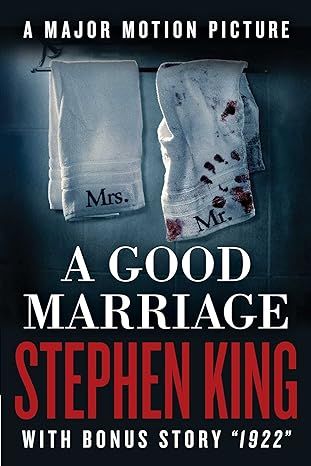
A Good Marriage
4.1
-
5,995
$4.99
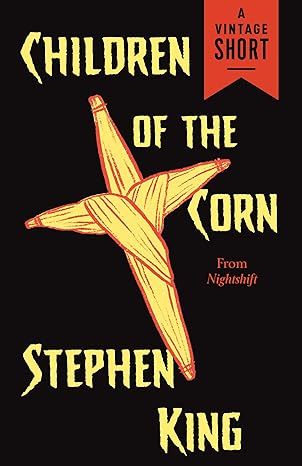
Children of the Corn (Kindle Single) (A Vintage Short)
4.3
-
1,084
$0.99
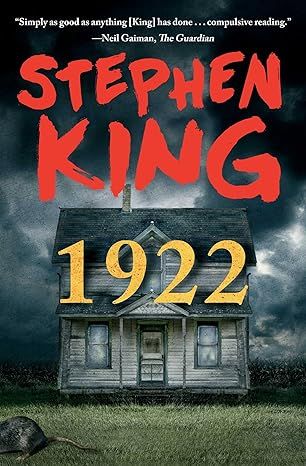
1922
4.6
-
6,082
$7.99
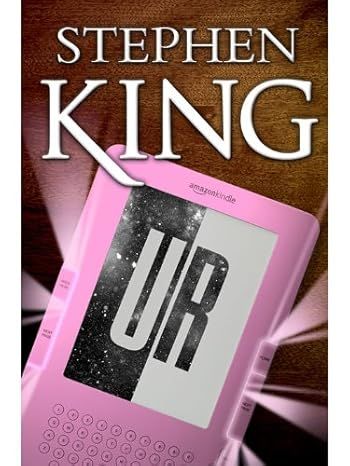
UR
4.3
-
6,140
$3.99
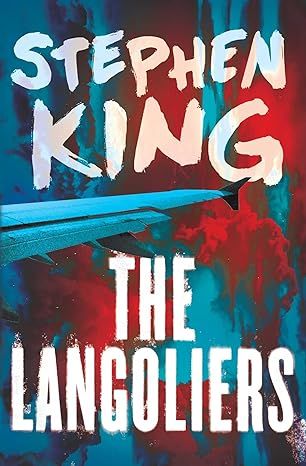
The Langoliers
4.6
-
1,014
$6.49

The Girl Who Loved Tom Gordon: A Novel
4.5
-
4,774
$1.17
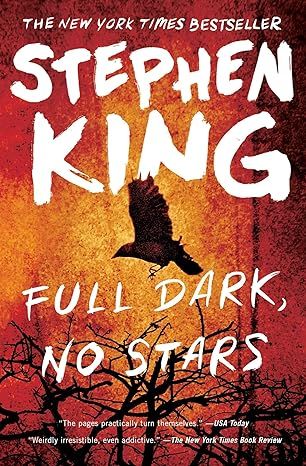
Full Dark, No Stars
4.6
-
6,762
$5.00

Gwendy's Button Box: A Novella (Gwendy's Button Box Trilogy Book 1)
4.5
-
21,335
$3.88
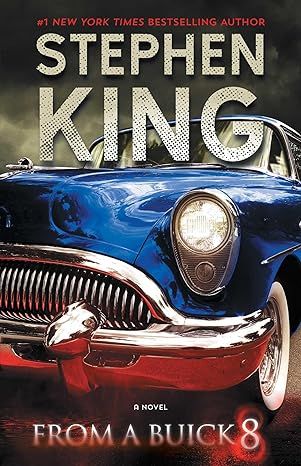
From a Buick 8: A Novel
4.3
-
2,174
$11.99
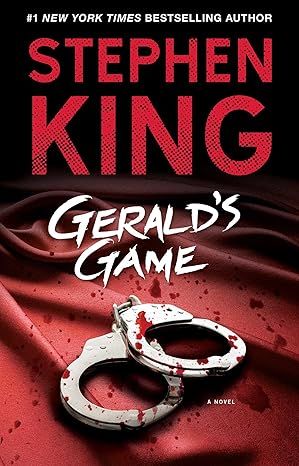
Gerald's Game
4.2
-
3,838
$1.97
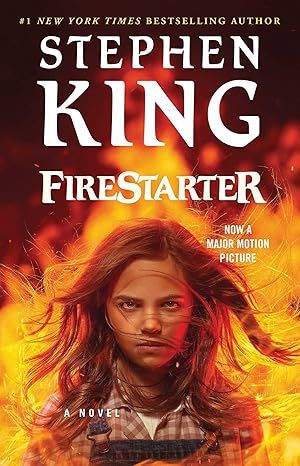
Firestarter
4.6
-
5,489
$9.99
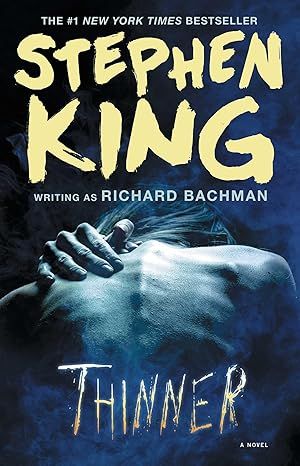
Thinner
4.5
-
3,107
$2.50
Best Sellers
View all
The Tuscan Child
4.2
-
100,022
$8.39

The Thursday Murder Club: A Novel (A Thursday Murder Club Mystery)
4.3
-
155,575
$6.33

Sapiens: A Brief History of Humankind
4.6
-
140,302
$13.49

The Butterfly Garden (The Collector, 1)
4.3
-
88,556
$9.59

Things We Hide from the Light (Knockemout Series, 2)
4.4
-
94,890
$11.66

The Last Thing He Told Me: A Novel
4.3
-
154,085
$2.99

The Perfect Marriage: A Completely Gripping Psychological Suspense
4.3
-
143,196
$9.47

The Coworker
4.1
-
80,003
$13.48

First Lie Wins: A Novel (Random House Large Print)
4.3
-
54,062
$14.99

Mile High (Windy City Series Book 1)
4.4
-
59,745
$16.19

Layla
4.2
-
107,613
$8.99

The Locked Door
4.4
-
94,673
$8.53
